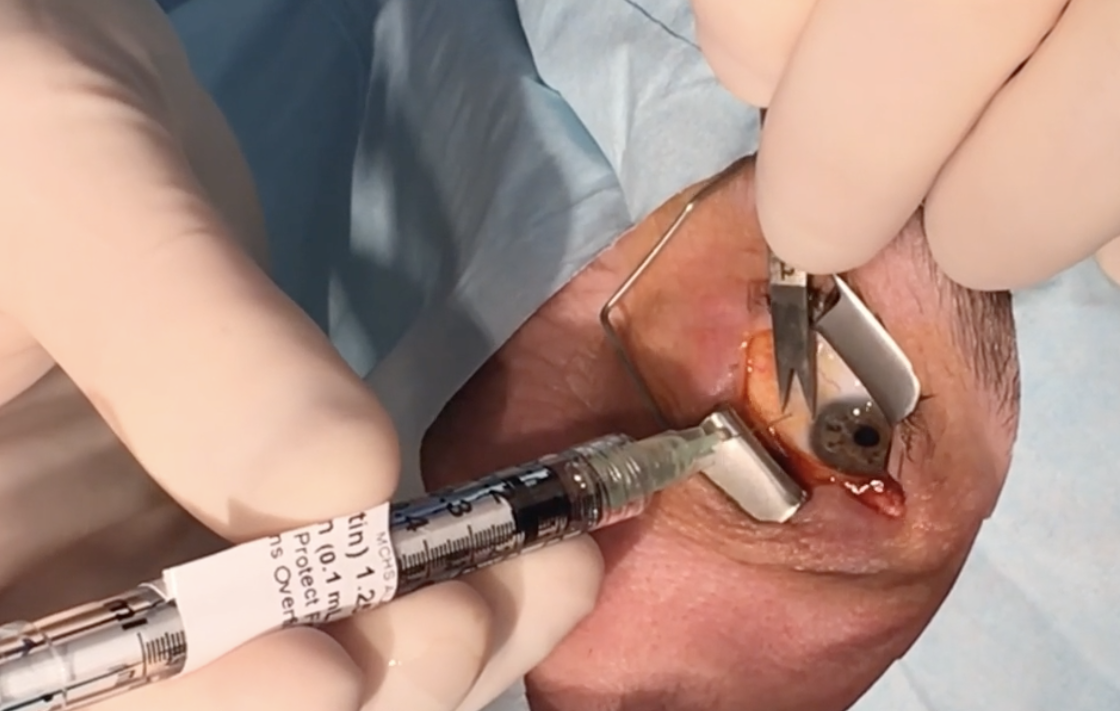 |
| IOP elevation may occur during and after anti-VEGF treatment regardless of the specific agent administered. Photo: Leonid Skorin Jr., DO, OD, MS. Click image to enlarge. |
Anti-VEGF injections are the standard of care for the treatment of several eye diseases, including wet AMD, RVO and DME, yet previous research suggests sustained use may elevate IOP in some individuals. However, a recent study that compared different anti-VEGF agents reported no clear difference between the therapies and controls when it came to sustained IOP increases at 12 and 24 months after the start of treatment.
The study, which included about 12,500 eyes, analyzed 26 randomized control trials that compared anti-VEGF agents aflibercept (2mg), bevacizumab (1.25mg) and ranibizumab (0.3mg and 0.5mg) to each other or to a control for the treatment of wet AMD, RVO or DME. Investigators considered the number of patients who at 12 and 24 months had an IOP that had increased 5mm Hg or more from baseline on consecutive visits, had increased 10mm Hg or more from baseline at any visit, was 21mm Hg or greater on consecutive visits or 25mm Hg or 30mm Hg or more at any visit, prompted initiation of IOP-lowering medications or had increased significantly per the clinician’s discretion.
Based on a total of 83 out of 84 estimates, the investigators found no statistically significant differences between the anti-VEGF agents (low to moderate certainty of evidence). Still, ranibizumab 0.5mg had higher IOP measurements of 30mm Hg or more at 12 months compared with bevacizumab (low certainty of evidence).
Additionally, 53 out of 56 estimates demonstrated no marked difference between anti-VEGF agents and controls (low to moderate certainty of evidence). However, ranibizumab 0.5mg had higher rates of consecutive IOP increases of 5mm Hg or greater at 24 months (low certainty of evidence) and higher rates of IOP increases as per the clinician’s discretion at 12 and 24 months (low and very low certainty of evidence, respectively).
The 95% credible intervals in all comparisons without statistically significant findings didn’t rule out important clinical effects, and the certainty of evidence in these comparisons was limited by imprecision, the researchers noted.
“The results of this investigation can aid in informing patients regarding the risks and benefits of anti-VEGF therapy, assist in providing clarity into the need for prophylactic IOP-lowering therapy and help guide practice patterns to inform the frequency of IOP monitoring in patients receiving anti-VEGF therapy,” the authors wrote in their paper. “Furthermore, it is feasible that future anti-VEGF therapy may have a different IOP safety profile.”
Nanji K, Sarohia GS, Kennedy K, et al. The 12- and 24-month effects of intravitreal ranibizumab, aflibercept and bevacizumab on intraocular pressure: a network meta-analysis. Ophthalmology. December 3, 2021. [Epub ahead of print]. |

